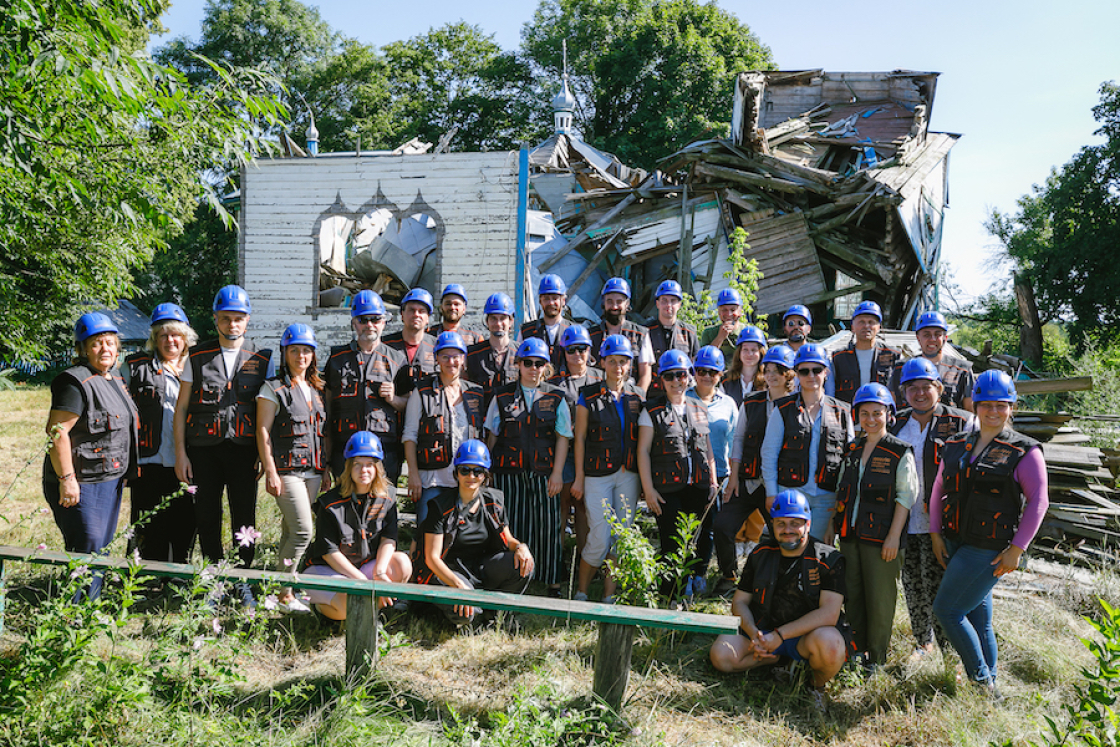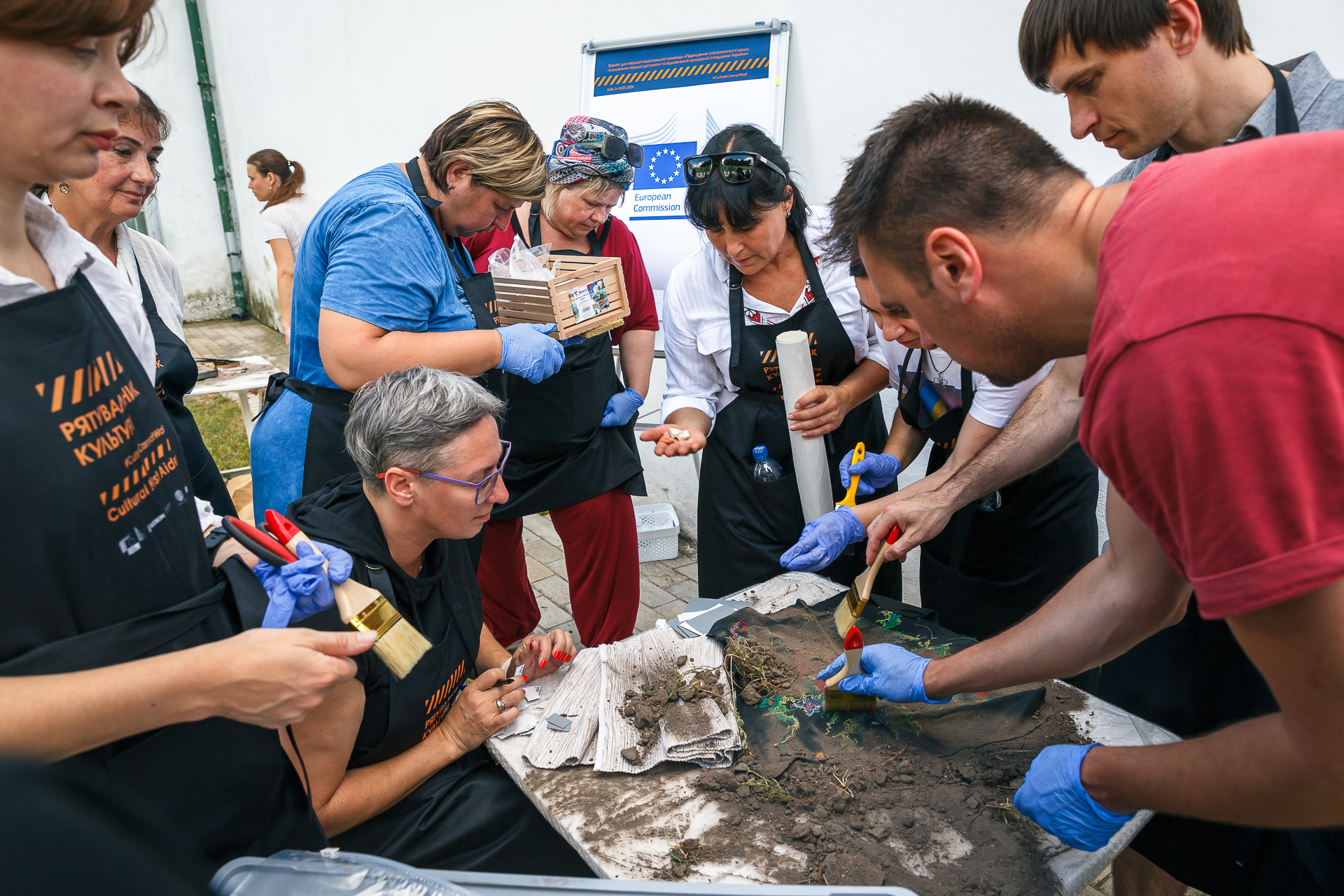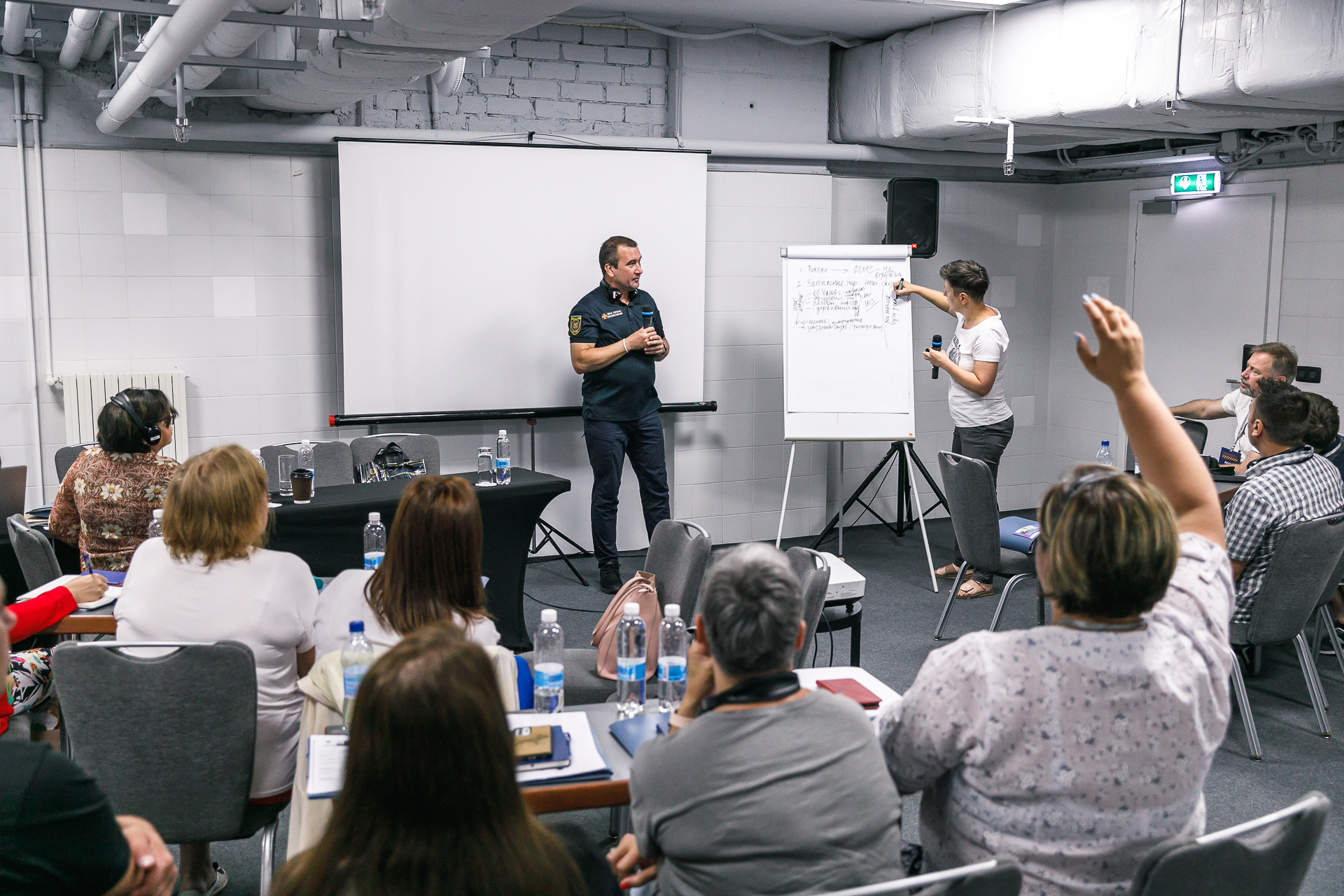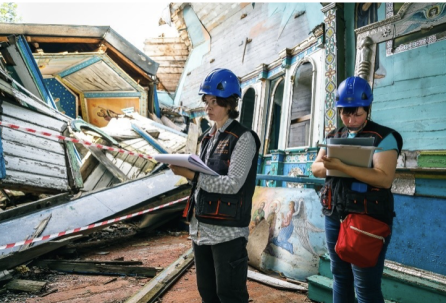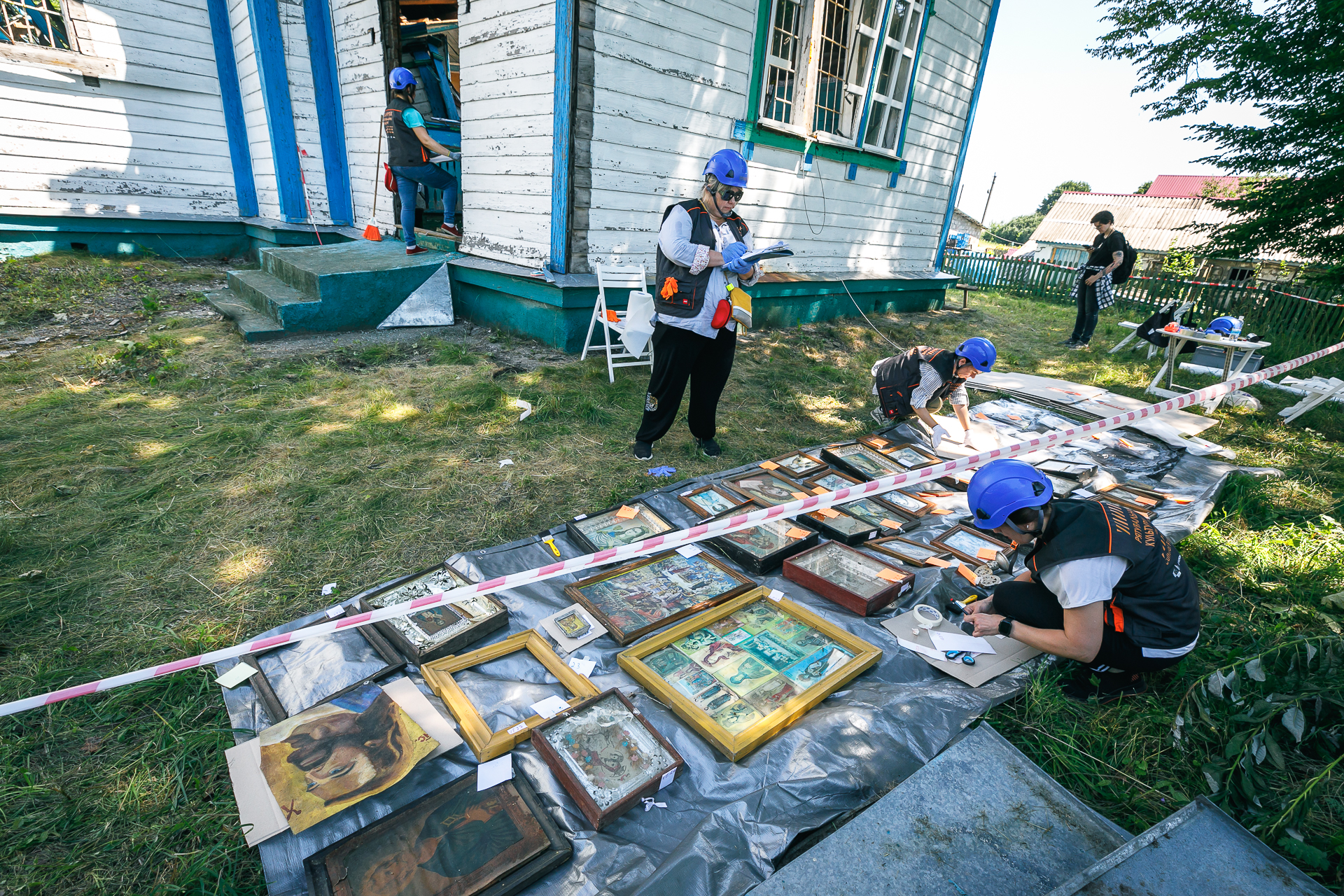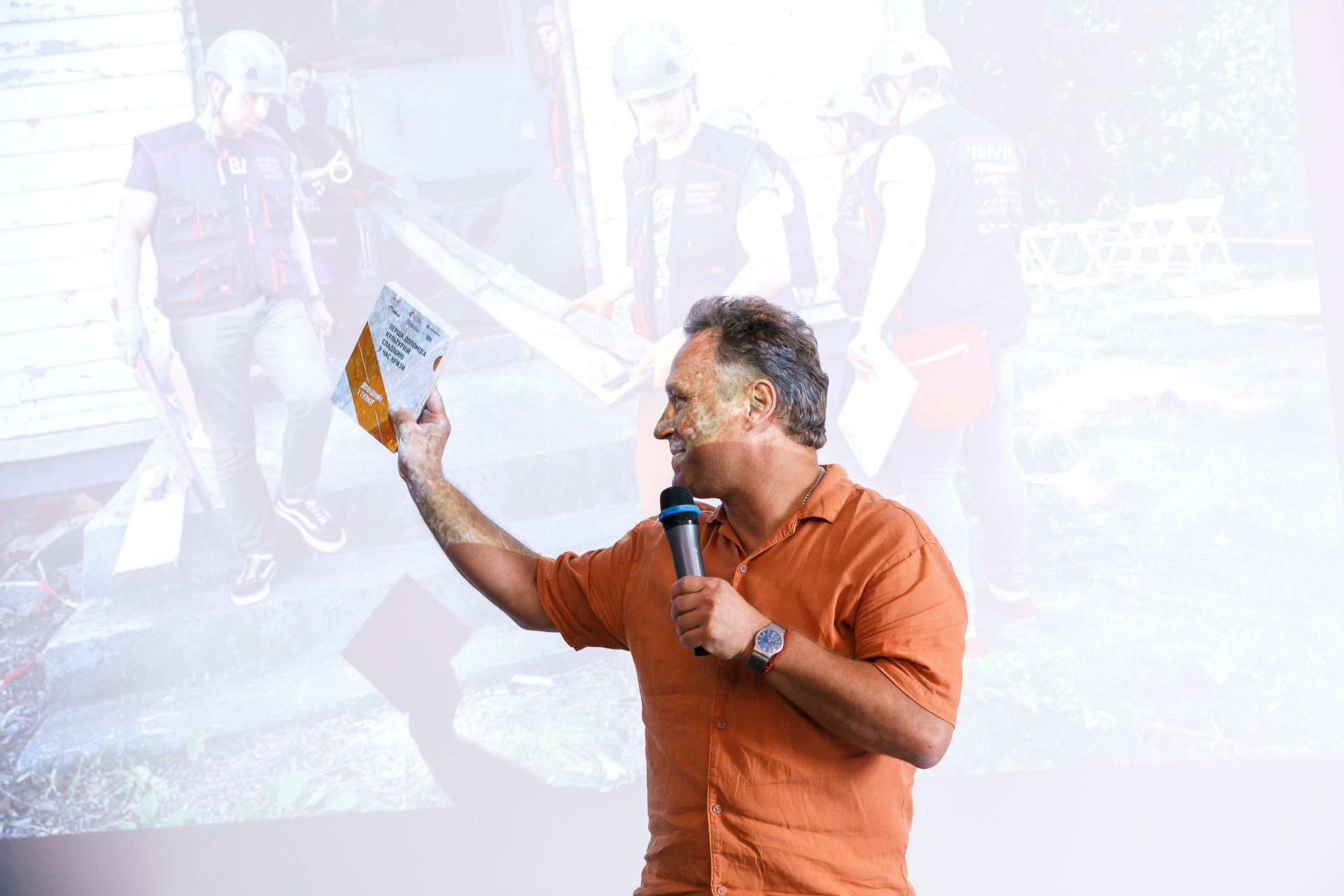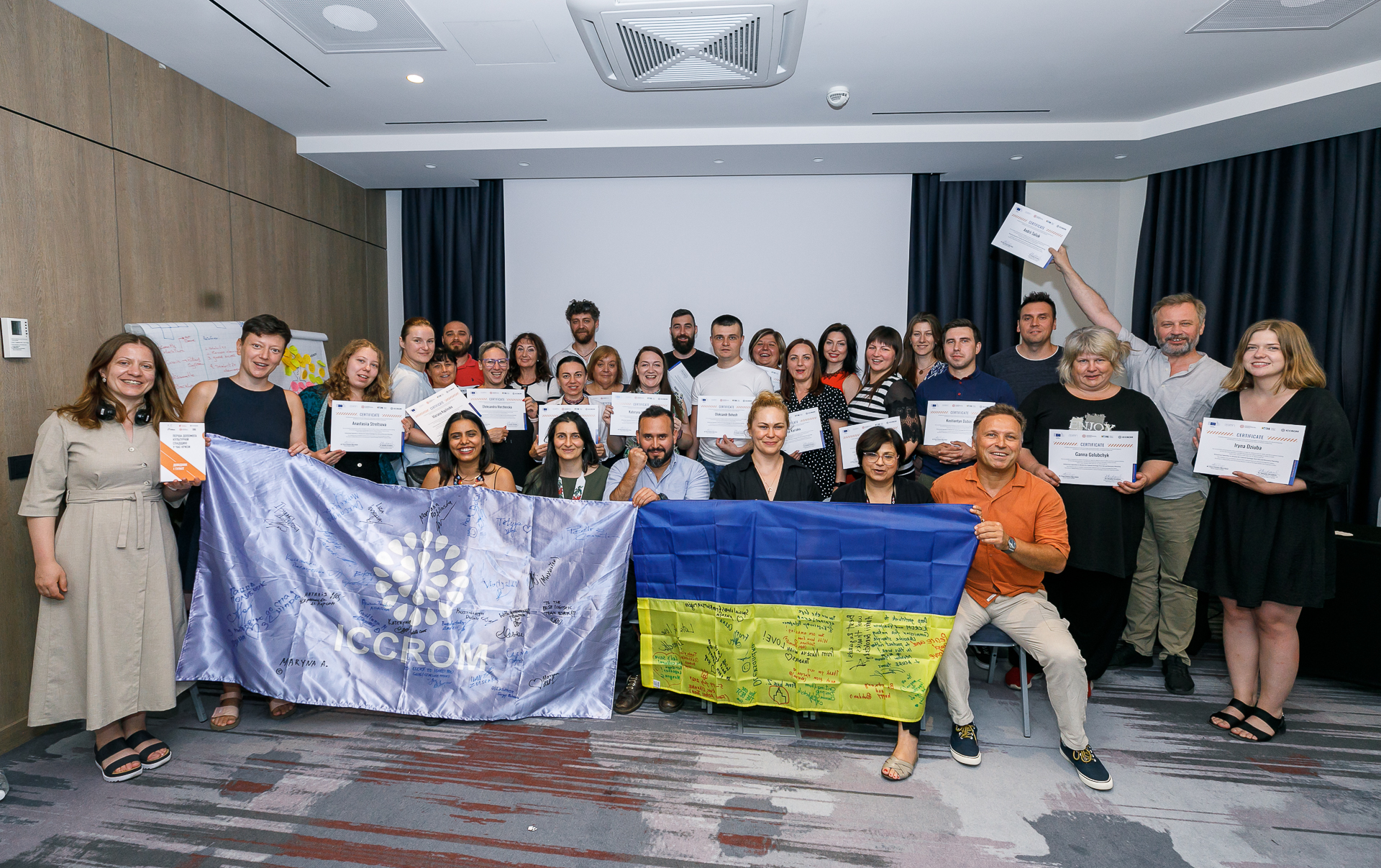In a groundbreaking effort to protect Ukraine’s endangered cultural heritage, ICCROM's First Aid and Resilience for Cultural Heritage in Times of Crisis (FAR) programme has trained 23 heritage professionals from 11 oblasts, establishing Ukraine’s first national team of cultural first aiders, ready to recover and safeguard the nation’s invaluable heritage amid the ongoing armed conflict.
This blended training is part of the "Enhancing Capacities in Ukraine for Cultural Heritage First Aid and Recovery Planning" project, conceived with the generous support of the European Commission Directorate-General of Education, Youth, Sport, and Culture (DG EAC) and implemented in collaboration with the Ministry of Culture and Information Policy of Ukraine (MoCIP), the Agency for Cultural Resilience (ACURE), Maidan Museum, and the Heritage Emergency Response Initiative (HERI).
In response to the ongoing large-scale emergencies, Ukraine’s newly trained team of cultural first aiders, is now equipped to assess, mitigate, and reduce disaster and conflict risks to all types of heritage. They are prepared to be deployed to document, secure, and salvage historic structures and valuable collections from museums, libraries, and archives in the event of an emergency. Additionally, the team has developed essential skills to collaborate effectively with emergency responders, civil protection personnel, as well as military and humanitarian aid professionals to ensure coordinated action, while ensuring personal safety and security.
The training program was designed in two interconnected phases, blending online and in-person learning:
Online Orientation Phase
An Introduction to Disaster Risk Management and First Aid to Cultural Heritage, held on 10 May 2024.
Building Common Terminologies and a Foundation for Disaster Risk Management and First Aid to Cultural Heritage, held from 24 to 27 June 2024
These consecutive online sessions helped develop a common language for first aid to cultural heritage in times of crisis, introducing the concept of disaster risk management for people and heritage, and associated technical terms. The sessions were instrumental in enabling participants to identify and assess factors contributing to the extensive damage of cultural heritage, and which are crucial to control in order proactively reduce risks and ensure resilient recovery.
In-Person Hands-On Training - First Aid, Early Recovery, and Risk Reduction for Cultural Heritage in Times of Crisis from 5 to 14 July 2024 in Kyiv, Ukraine
In early July, In early July, participants from across Ukraine gathered in Kyiv to successfully develop skills for assessing and mitigating risks, preventing damage to cultural heritage in crisis situations, and taking necessary steps to ensure early recovery post-crisis.
The course was inaugurated by distinguished representatives:
Ms. Anastasia Bondar, Deputy Minister for Digital Development, Digital Transformations and Digitalization of the Ministry of Culture and Information Policy of Ukraine (MoCIP)
Ms. Aruna Francesca Maria Gujral, Director-General, ICCROM
Mr. Stefan Zotti, Team Leader in the European Commission/DG EAC
Mr. Ihor Poshyvailo, Director of the National Memorial to the Heavenly Hundred Heroes and Revolution of Dignity Museum (Maidan Museum) and Co-founder of the Heritage Emergency Rescue Foundation (HERI)
Based on ICCROM’s methodology for First Aid to Cultural Heritage, the training was led by ICCROM-FAR’s Senior Programme Leader, Aparna Tandon. The expert teaching team included international cultural heritage and disaster risk reduction specialists Jui Ambani, Conservation Architect and Programme Officer at ICCROM; Pedro Cantor, Civil Engineer at the University of Lisbon; Amra Hadžimuhamedović, Director of the Centre for Cultural Heritage at the International Forum Bosnia; Rand Eppich, Conservation Architect and Specialist in Management of Cultural Heritage Places and Business Management; and Alessia Strozzi, Conservation Officer in the Education & Research Area of the Superintendence of Marche Region, Ministry of Cultural Heritage, Italy. National experts were also part of the teaching team, including Kateryna Chuyeva, Deputy Minister of Culture and Information Policy of Ukraine (MoCIP); Olha Salo, Deputy General Director for Development and Cultural and Educational Work at the National Museum of the Revolution of Dignity and Project Coordinator at the Agency for Cultural Resilience (ACURE); Igor Bokalo, Architect; and ICCROM-trained cultural first aiders.
Over two weeks, the teaching team delivered lectures and planned hands-on exercises, as well as live demonstrations to develop participants' skills in securing and stabilizing heritage structures and cultural collections during emergencies. Participants learned to set up temporary storage, safely handle collections, strengthen early warning systems, and identify and map stakeholders in disaster risk management and recovery. Participants were further introduced to tools and technology for emergency documentation of buildings, including ICCROM-FAR’s app for damage and risk assessment and photogrammetry. These experiences equipped participants to plan, scale, and implement cultural first aid operations during large-scale emergencies, and lead early recovery efforts with sustainable, holistic and resilient strategies.
With significant inputs from representatives from the Ukrainian State Emergency Management Services (SEMS), participants were introduced to personal safety and security measures to be considered while planning field missions, as well as early warning and response systems in place at the national and local levels in Ukraine.
Words into Action: Planning and Implementation of First Aid Actions in the Historical Church of Viazivka to promote its early recovery
The training provided participants with a chance to put their learning into practice. They collaborated with the multidisciplinary cohort of lecturers to develop an action plan for the 160-year-old wooden Historical Church of Viazivka, a national monument severely damaged by shelling. Over three days, with crucial support from disaster risk experts and emergency responders, the trained team of cultural first aiders carried out a thorough damage and risk assessment. They further evaluated the historical significance of the Viazivka church and identified damage to both its structural and non-structural elements. This comprehensive assessment enabled them to develop targeted salvage and evacuation plans for the site.
As part of the recovery planning for Viazivka Church, the team crafted a detailed, step-by-step Security and Stabilization Plan. They organized the safe sorting, documentation, covering, and evacuation of valuable movable objects. Additionally, they engaged with local communities and cultural stakeholders to ensure inclusive and integrated heritage protection strategies.
The culmination of these efforts was the establishment of a secure temporary storage space for the church’s historic collections and building components. Building on the insights gained from the fieldwork, the team is now preparing a detailed report and recommendations to steer future recovery and conservation efforts.
A Major Milestone: Launch of ICCROM’s First Aid to Cultural Heritage in Times of Crisis (FAC) Handbook and Toolkit in Ukrainian
The course concluded with a significant milestone: the launch of the Ukrainian version of ICCROM's comprehensive "First Aid to Cultural Heritage in Times of Crisis" Handbook and Toolkit. This essential resource provides crucial guidelines and practical tools for safeguarding both tangible and intangible cultural heritage before, during, and after a crisis. It reflects the methods taught to the new cohort of cultural first aiders in Ukraine.
The translated resource will be available as one of ICCROM-FAR emergency response resources into Ukrainian.
Next Steps: Shaping the Future for Ukraine's First National Team of Cultural First Aiders
As the newly trained team focused on Ukraine’s heritage recovery and crisis preparedness, the group of 23 cultural first aiders is set to collaborate with local authorities and humanitarian organizations. They will plan and implement heritage recovery efforts and develop risk-informed strategies at local, national, and international levels. Stay tuned as the team drafts their action plans, applying lessons learned from the training to protect damaged cultural heritage at sites and institutions across Ukraine and lead the way toward its full recovery.

